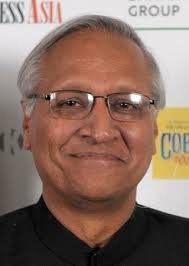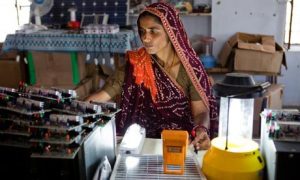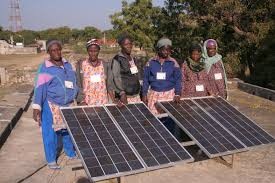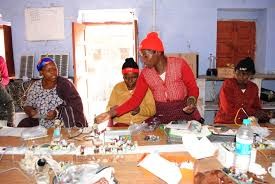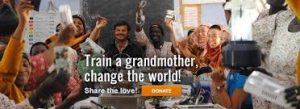Bunker Roy’s Barefoot College
Today when we see politicians investing and running educational institutions which don’t make any sense; when we are witnessing business made out of educational institutions; and we are also seeing lacs of educated youth struggling to get jobs……..in this scenario there is one unique institution in Rajasthan, India which is an extraordinary school called ‘’Barefoot College’’ which teaches rural women and men to earn their living with dignity. Some of these students are illiterate but they are becoming good solar engineers, artisans, dentists and doctors in their own villages. The founder Bunker Roy is an astonishing human who has changed lives of so many poor, illiterate people for the better and empowered them poor to gain access to a bright future. In a country where countless people live below the poverty line, this college is transforming lives of countless people.
Established in 1972, the Barefoot College is a non-government organisation that has been providing basic services and solutions to problems in rural communities, with an objective of making them self-sufficient and sustainable. These ‘Barefoot solutions’ can be broadly categorised into solar energy, water, education, health care, rural handicrafts, people’s action, communication, women’s empowerment and wasteland development. The College believes that for any rural development activity to be successful and sustainable, it must be based in the village as well as managed and owned by those whom it serves. Therefore, all barefoot initiatives whether social, political or economic, are planned and implemented by a network of rural men and women who are known as ‘Barefoot Professionals’.
The Barefoot founder Prof. Sanjit Roy more famously known as ‘Bunker’ Roy completed his formal education in The Doon School (1956-62) and St. Stephens College Delhi University (1962-1967). He was the Indian National Squash Champion in 1965, 1967 and 1971. His “real” education started when he dug open wells for drinking water as an unskilled labourer for 5 years (1967-1971). He saw how the most extraordinary knowledge and skills the rural poor have and they need to challenge unexpected situations in daily lives; this inspired Bunker to establish the only fully solar electrified Barefoot College in the deserts of Rajasthan in India 40 years ago. It is the only College in India built by the poor and managed by the rural poor who earn less than $ 1/day. Almost the only College left in India that respects and practices the work style and life style of Mahatma Gandhi. It is a College where the teacher is the learner and the learner the teacher. It is the only College in India where traditional knowledge and practical skills of the poor are given more importance and priority than paper degrees or qualifications. Prof. Roy is a great believer in Mark Twain who said, “Never Let School Interfere with your Education.”
In fact knowledge often corrupts our creative instincts.
Rural men and women irrespective of age, educational backgrounds cannot imagine to get the lowest government job, hence are being trained to work as day and night school teachers, doctors, midwives, dentists, health workers, balsevikas, solar engineers, solar cooker engineers, water drillers, hand pump mechanics, architects, artisans, designers, masons, communicators, water testers, phone operators, blacksmiths, carpenters, computer instructors, accountants and kabaad-se-jugaad (creating functional things from rags) professionals. With little guidance, encouragement and space these people grow and exhibit their talent and abilities, people who have been considered ‘very ordinary’ and written off by society, are doing extraordinary things which sounds most unbelievable until you see this with your eyes.
The College has adopted the Gandhian ideas into its lifestyle and work ethics, holding it true and relevant universally even in the 21st Century. Because it is a Centre for learning, with a difference:
- It’s a centre of learning and unlearning
- Where the teacher is the learner and the learner a teacher; that’s the real essence of teaching-learning process.
- Where everyone is expected to keep an open mind, try new and crazy ideas, make mistakes but never give up and try again.
- The college welcomes even those who have no degrees are welcome to come, work and learn.
- Where those are accepted who are not eligible for even the lowest government jobs.
- Here tremendous value is placed on the dignity of labour, of sharing and those are willing to work with their hands;
- The best thing – no certificates, degrees or diplomas are given; so nobody’s ego is inflated.
The Barefoot College is viewed as a success story because it is shown as an example of what is possible when a very ordinary person is allowed to develop by himself. It is a new concept that has stood the test of time. What the College has effectively demonstrated is how sustainable the combination of traditional knowledge (barefoot) and demystified modern skills can be, when the tools are in the hands of those who are considered ‘very ordinary’ ‘illiterate’ and are written off by urban society.
The Barefoot College represents and decentralises sophisticated technology by handing its control to poor communities in rural India. It believes that even the poorest of poor cannot be denied the right to use, manage and own technology to improve their own lives. The aim has been to develop the capacity and competence of communities to take decisions and responsibilities and improve their management capabilities. The Barefoot College augments their self-confidence by providing them access to learning to harness their ability to serve their own community, thus making them more confidently self-reliant.
This college encourages a hands-on learning-by-doing process of gaining practical knowledge and skills rather than written tests and paper based qualifications. It promotes and strengthens the kind of education one absorbs from family, community, and personal experience. It applies the knowledge and skills that the poor already possess for their own development thus making them independent and letting them live with self respect and dignity. Very ordinary people who are ignored by society are doing extraordinary things that challenge description.
It’s worth knowing that in a village, for instance, a shopkeeper is more that just an outlet for provisions; he keeps seeds and fertilisers for distribution, he sells contraceptive, he reads newspapers and disseminates information, and sometimes he is also a member of the village council. He in fact is the last word in integration. This applies also to the school teacher.
No project plan was designed in advance, no clear time schedule, no detailed programme activities, no organisational and administrative arrangements, project staff or physical inputs, etc. Tilonia (name of the village) where Barefoot is established let the organisation grow as a process where human beings and their development, their confidence and personal growth meant more and mattered more.
The investment was more in people than in projects. This has been the first priority. No recruitment through advertisement but by word of mouth, by trial and error.
Barefoot College started with a groundwater survey and gradually built in a health and education programme (1974) when they managed to attract two well-trained and highly motivated women from the Tata Institute of Social Sciences. In 1975-96, when the Barefoot Collage managed to locate the right person, it started the Rural Industries Section and the Agricultural Extension Programme (1975). Other programmes followed until 1979, when the BC changed its way of functioning and decision-making. No longer did it depend on the director, but group was formed which took all the major decisions. The BC could not possibly plan and implement programmes from Tilonia for a territory of 500 square miles; the block was sub-divided into field centres, each looking after 6-25 villages depending on the staff and their capacity.
What makes the barefoot approach essentially different is that it does not give certificates, diplomas or degrees to its students. They have to learn things practically. The certification is done by the community they serve. The issuing of certificates is one major reason why migration takes places from the villages to the cities. I think today every developing nation in the world requires many Barefoot Colleges.













































